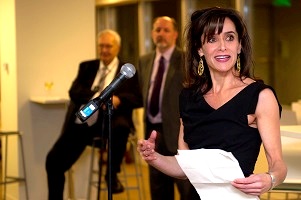S. Sudan hires US firm to improve foreign relations
March 15, 2014 (JUBA) – Faced with the seemingly deteriorating relation between its government and the United States administration, South Sudan has reportedly hired a Washington-based public relations firm to improve its diplomatic ties with the former.

Highly placed sources confirmed that the country’s minister for the presidency, Awan Guol Riak indeed sought services of the reputable firm.
“We really need to improve our relations with the west and the media. If this firm can do that, especially this time of this crisis, it would be a big diplomatic achievement,” an official who declined to be named told Sudan Tribune Saturday.
Established by L. Riva Levinson in 2007, KRL International reportedly strives to meet the growing demand from decision-makers looking for comprehensive services to bridge the divide between the US and global emerging markets.
President Salva Kiir, sources told Sudan Tribune, believes the firm would develop communication with the Obama administration, international donors, the media, non-governmental entities as well as multilateral institutions in order to provide support in efforts to consolidate peace, reconciliation and development priorities.
The firm will reportedly advocate for direct communication between authorities in Juba and key officials close to President Obama and the Congress in Washington.
STRAINED RELATIONS
Relations between Juba and Washington began to shows signs of strain in 2011 immediately after South Sudan seceded from Sudan following its self-determination referendum necessitated by 2005 peace deal, which ended its over two decade conflict with Khartoum.
But many independent analysts and observers attribute the growing uneasiness in relations between the two countries, to claims that the South Sudan leader during one of his official visits to Washington after the country’s independence misled his US counterpart about Juba’s alleged support to Sudanese rebels fighting in South Kordofan and Blue Nile states.
At a meeting with the US leader, President Kiir reportedly denied that his country was maintaining any links with the SPLM-North rebels, which were until South Sudan’s secession from Khartoum, part of Juba’s ruling party (SPLM) and its army (SPLA).
Some observers have, however, attributed the strained relations between Juba and Washington to the emerging undemocratic tendencies, which critics say has stalled internal reform within the country’s ruling party.
Many South Sudanese citizens say the US and other nations have overlooked the SPLM’s growing authoritarianism, as well as numerous violations against human rights and press freedom.
In mid-December last year, differences within the SPLM spilled over into the army triggering fighting, which President Kiir and his supporters claim was a coup attempt. This has, however, been denied by those accused of instigating the conflict, including former vice president Riek Machar.
All the accused deny there was any coup attempt and many of them are now part of a rebellion against the government.
The Juba administration has relentlessly been trying to convince the international community of its version of events, albeit with very little success.
PUBLIC REACTIONS
Deng Mawien a native Northern Bahr el Ghazal commended the decision of the government to hire lobbying firm with close links with officials from different western countries, including the US.
“This is a good development if what is said is true. Our government is beginning to grow and started realizing the importance of having lobbying group in key countries. There is no free service. This should have been done long time ago to complement the work of our diplomats”, Mawien told Sudan Tribune on Saturday.
Deng Wilson Wieu, a native of Warrap said the money being given by the government to hire lobbying group should have been used in the past to lobby for western and regional support during the border conflict with neighbouring Sudan in 2012 as well as the unresolved post-secession issues.
“The money being ditched out at the moment to Uganda and the lobbying firms as a result of this conflict would have added a value if used to support the tilt in western and regional opinion on border conflict with Sudan instead of internal matters,” Wieu told Sudan Tribune in a separate interview on Saturday.
“A solution should never be imported but exert necessary effort to find [an] internal solution”, he added.
(ST)
